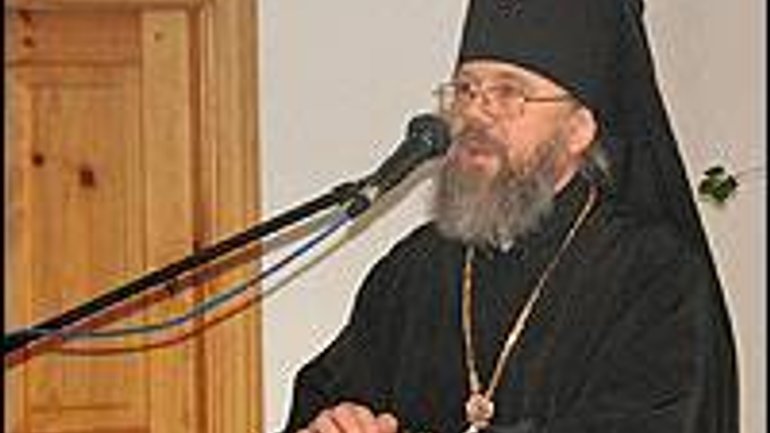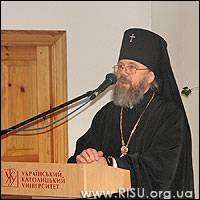“I want the romantic-lyric in ecumenical discussions to make concessions to practical questions.”

 Interview with Archbishop of Lviv of the Ukrainian Orthodox Church-Moscow Patriarchate AUHUSTYN (Markevych)
Interview with Archbishop of Lviv of the Ukrainian Orthodox Church-Moscow Patriarchate AUHUSTYN (Markevych)
The interview was given during the international colloquium “Ecumenism, Interreligious Dialogues, and Fundamentalisms,” held at the Ukrainian Catholic University in western Ukrainian Lviv on 20-23 April 2007. Archbishop Auhustyn participated and spoke there.
— Your Excellency, please give us your evaluation of matters of ecumenical dialogue in Ukraine.
— First of all, it’s necessary to determine what we want. I consider it categorically inadmissible to talk about some “virtual” or fantastic things. An ecumenical theme should be practical. For example, I don’t understand how one can talk about the Kyivan church, without explaining what one has in mind. In Europe there are Protestants, Catholic, and Orthodox; however, no one talks about the French, German, or Dutch church. A definition of terms is always necessary. Similar self-deception leads to an impass. If one speaks of the practical side, from the beginning it is worthwhile to stop opposition and hostility, and only then to talk about mutual understanding and joint projects.
As I already mentioned in my speech, if you can’t or don’t want to do good, then at least don’t do evil. But you see today what kind of relations there are among denominations. Perhaps in time it will be easier. Demonstrative is the situation of our diaspora in Canada and America, where after a number of years there is division and no mutual understanding among all. And this is not only a problem of the Ukrainian people, this misfortune, this sin...
So, when one is talking about cooperation, I want to have in mind concrete things, challenges of today. We need to show to politicians and all our society the example of sincerity. The tragedy of the Maidan [Kyiv’s Independence Square] lies in the fact that, as opposed to those who stood and froze around the stage, the majority of those who went up to the podium were insincere. I don’t want to go deeply into this theme, but they should openly say who they are, where they were, how they came to power and what they want. It was necessary to speak the bitter truth and say: this is all behind, we are with you, people, we will go forward. And then the Lord would bless, and any untruth is the leaven of the Pharisees, which is from Satan. The Lord commanded [us] to defend against this leaven.
Until those times, disorder will continue in the government and misunderstanding among the denominations, as long as there is untruth and insincerity. And the events of Holy Week, what was that? [Editor’s note: Ukrainian President Viktor Yushchenko dismissed Parliament and the Cabinet of Ministers.] I think that until there is a correction, this will be a sign of still greater misfortune. They call Kyiv the second Jerusalem. You’ve also heard, maybe, the phrase “Holy Rus,” reflections regarding hilly Jerusalem, the spiritual Israel. And it was necessary that during Holy Week, 2000 years after the birth of Christ, this happened. The only way out of all this is the boldness to become sincere, good, tolerant, to reject double standards in politics.
You know the situation of the Lviv Eparchy. The great majority of deputies of the Lviv City Council are Greek Catholics, which they don’t conceal. On the contrary, they are proud of this. Why don’t these children of the Greek Catholic Church listen to the call of their spiritual father, His Beatitude Cardinal [Lubomyr] Husar, and even the Vatican, about the necessity of allotting to the Lviv Orthodox Eparchy land on which to build a cathedral church? For 15 years this has not passed a vote; except for one or two people no one supports this. What then to expect from simple people, whom they turn into zombies? What is there for me to hope for? Then what are we talking about? I want the romantic-lyric in ecumenical discussions to make concessions to practical questions.
— In your speech at the colloquium you spoke very well about concessions. What concessions is your church prepared to make?
– Say what you expect and want. Speaking about concessions, it is always necessary to hear what they want from you.
— That is, above all, it is necessary to listen…
— Above all, it is necessary to be sincere. Here there is a problem of identification, self-awareness, understanding who you are. You gave attention to my words in the speech. I was talking about the fact that my best relations in the Lviv Region are with the Roman Catholics and the worst with the Greek Catholics. At the start foreigners think that this is an incorrect translation or I expressed myself incorrectly, and then they sympathetically smile. There are a few reasons for such a state of things. First of all, with the Roman Catholics we have no misunderstanding as to identification. We are not trying to prove something to one another or out-do one another: who is more correct in faith or better in patriotism. We know who is who. But this is a constant problem with the Greek Catholics: both sides need to prove something, to explain, to defend themselves. Why is it this way? It means something is not right. In order to resolve this problem, a multi-level commission of the three. I do not expect the Greek Catholics to renounce their convictions, for that is not possible. I can only hope this; certainly even in paradise the Lord did not hold Adam and Eve by the hand to keep them from falling into sin. But, above all, it is necessary to be honest, sincere.
– The World Council of Churches, the Faith and Order Commission, has publicized the draft of the document “The Nature and Mission of the Church.” What is your attitude towards this document? What is the attitude of your church towards this document? Do you see in this document some traces of Orthodox thought?
— Of course. in comparison with the previous, here there is progress and the great influence of the Orthodox community, Orthodox representation. There was a point when irreversible processes started and the Orthodox side announced: Let us be open and not force one another to accept a decision which is not registered in dogma and the canons. This was worked on, and so I see progress. On the other hand, it saddens me that here and there is spread and even imposed an unjustified liberalization in the Christian environment, in particular, some who consider a female priesthood normal, homosexual marriages are recognized by separate Christian denominations. I think that this is very serious, and so that the Protestants would not go so far, they should not revise fundamental Christian principles, especially those related to Biblical and Gospel moral principles.
Tetiana SHPAIKHER conducted the interview in Lviv on 23 April 2007.









